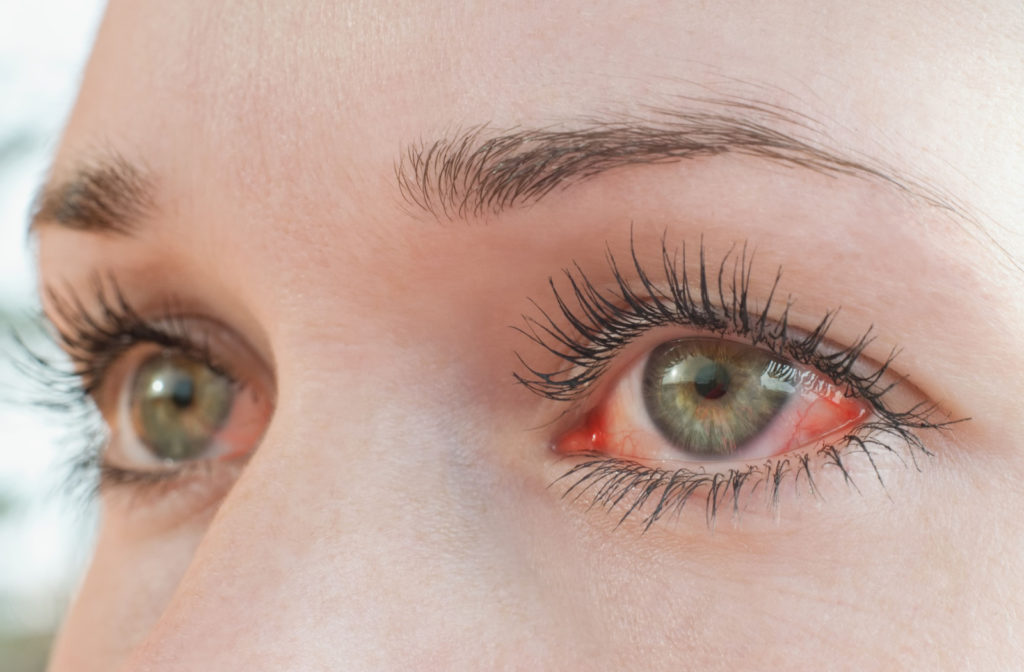Have you ever felt like there’s too much pressure in your eyes, or that they’re more difficult to move than normal? If so, it’s not something to brush off. Your eyes typically aren’t supposed to feel noticeable pressure, and this is often an indicator that you’re developing a more serious eye condition. This can be a sign of:
- Allergies
- Sinus infections
- Migraines
- Glaucoma
If you’re feeling more pressure than usual in your eyes, you should schedule an eye exam with an experienced optometrist to receive a proper diagnosis of what’s causing this sensation.
1: Allergies
When you’re allergic to something, your body releases histamines in response, which can cause inflammation and swelling in various parts of the body—including your eyes. Though it doesn’t happen to everyone, many people find that their eyes simply feel strange or different during an allergic reaction.
How to Treat Allergies
Managing this kind of eye pressure involves treating the allergy itself. Over-the-counter antihistamines can help reduce symptoms, but for more severe allergies, you might need prescription medication. Don’t forget, avoiding the allergen altogether is always a good course of action!
2: Sinus Infections

Your sinuses are air-filled cavities located around your nose and eyes. But they often get infected or inflamed if a bacteria or virus enters the body like the common cold. It can cause them to swell and become irritated in a condition known as sinusitis.
A sinus infection often causes:
- Fevers
- Coughs
- Headaches
- Nasal congestion
- Difficulty in breathing
And in many situations, a sinus infection causes the feeling of pressure behind the eyes. The sinuses are swelling and putting pressure on the area.
How to Treat a Sinus Infection
In many situations, you can treat a sinus infection with over the counter medications. It can help to take decongestants to reduce the sinus inflammation. If your symptoms are severe or persistent, visit a medical professional to get proper treatment.
3: Migraines
Many people think that a migraine is just a headache. But it’s actually a neurological condition that can cause severe pain and pulsing sensations in the head. They usually only affect one side of the head at a time, but it’s not unusual to feel pain on both sides.
Migraines are closely linked to several eye troubles as well. Since the brain and eyes are so closely linked, they can often begin to cause trouble with your vision or physical sensations of pain and irritation in the eye.
They also often cause:
- Nausea
- Sensitivity to light and sound
- Vision changes or disturbances
- Visual halos around lights
How to Treat a Migraine
You can usually manage a migraine with a multi-pronged approach. Take anti-inflammatory medication or prescription medication and rest while symptoms subside. However, if you find you frequently experience migraines, you should visit a doctor. Migraines can often be an indication that something more serious is developing.
4: Glaucoma
Glaucoma is a group of eye conditions that eventually damage the optic nerve—most often due to an increase in your eye pressure. There are several types of glaucoma:
- Open-angle glaucoma, which is the most common version. The eye’s natural drainage system becomes impaired and stops draining properly, leading to a slow buildup of intraocular pressure. This condition typically onsets slowly, but progresses without symptoms in the earlier stages. Fortunately, it can be detected during a comprehensive eye exam to allow for earlier treatment.
- Secondary glaucoma, where it’s caused by another medical condition.
- Angle-closure glaucoma, which is a serious medical condition. If you notice pain in one or both eyes and start to feel a buildup of pressure, seek medical attention.
Glaucoma is often called the “silent thief of sight” since it directly damages the optic nerve. Like most nerves in your body, the optic nerve can’t heal once it’s damaged. This makes it crucial to regularly schedule comprehensive eye exams so you can catch conditions like glaucoma early on, before they do any long-lasting damage.
How to Treat Glaucoma
For glaucoma, treatment varies depending on the type you’re diagnosed with. Open-angle glaucoma and other milder forms can often be treated with medication to reduce eye pressure or through laser treatment. But angle-closure glaucoma often requires more advanced surgery to avoid permanent damage to your vision.
When to Visit Your Optometrist
If you’re noticing there’s pressure in your eyes—or any other kind of noticeable sensation or vision changes—you should visit us at Foothill Optometric Group. After all, it’s much better to be safe than sorry, especially when you’re thinking about your eyesight. We’re here to keep your vision clear, so book an appointment with us today!



